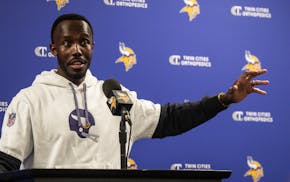After months of legal wrangling, Alex Rodriguez and Marc Lore are set to become majority owners of the Timberwolves and Lynx.
A three-member arbitration panel ruled longtime owner Glen Taylor did not have the right last year to cancel a pending sale of 40% of his ownership stake to Lore and Rodriguez. In a statement released through the Timberwolves and Lynx, Taylor said the vote was 2-1 in favor of Lore and Rodriguez.
The ruling makes way for the sale to be approved by the NBA Board of Governors. Lore and Rodriguez would then take over the franchises.
"We are extremely pleased with today's decision," Lore and Rodriguez said in a statement. "We look forward to working with the NBA to complete the approval process and close this transaction so that we can turn our attention to winning championships in Minnesota for our incredible fans and the Twin Cities community."
The arbitration panel was tasked with determining whether Taylor had breached the contract of his sale to Lore and Rodriguez based on the language from the equity interest purchase agreement the two sides signed in May 2021.
The rules of the arbitration stipulated that the three members of the panel, Tom Fraser, Kathleen Blatz and Joseph R. Slights, were not allowed to comment on the decision.
Messages left with Taylor and with William Savitt, the lawyer representing Lore and Rodriguez, were not returned.
In a statement, Taylor, who also owns the Minnesota Star Tribune, said he and his wife, Becky, were disappointed by the ruling. "We will review the decision thoroughly prior to making any further comment. We would like to express our sincere appreciation to Timberwolves and Lynx players, staff, and loyal fans for their support."
Arbitration experts in the Twin Cities noted ahead of the process that panel decisions are typically final.
"Arbitration awards are virtually unappealable," said Terrence Fleming, a lawyer at Fredrikson who specializes in business litigation. As a practical matter, Fleming said, the panel's decision will be final.
Egregious examples of fraud or bias — for instance, if one of the arbitrators didn't disclose a relationship with either party — could be grounds for appeal, but legal experts said it's extremely rare.
Lore and Rodriguez bought an initial 20% ownership stake from Taylor in May 2021, then executed the purchase of a second 20% tranche in December 2022. The call option on a third tranche, to give Lore and Rodriguez an additional 40% of Taylor's ownership stake and majority stakes in the Wolves and Lynx, was exercised Dec. 31, 2023.
The contract gave Lore and Rodriguez 90 days from that date to complete the purchase. Taylor released a statement that the sale was canceled exactly 90 days after the call option.
Days before that window closed, it was revealed that Lore and Rodriguez had lost the financial backing of the Carlyle Group, which Taylor said was set to put in $300 million for the deal. It was unclear whether the investment firm withdrew its funding or the NBA denied its participation.
Despite that last-minute financial setback, Lore and Rodriguez maintained they had another source of funding ready when Taylor canceled the sale.
That mattered contractually. A subsection of the purchase agreement labeled "Call Option Closing" noted that Lore and Rodriguez would be given an automatic 90-day extension on their call option if "all NBA approvals or other required approvals of any Governmental Entity have not yet been obtained."
The arbitration panel determined that extension should have been granted and Taylor's cancellation was a breach of contract.
Since then, Lore and Rodriguez have added New York City billionaire Michael Bloomberg to their ownership group. ESPN reported last year that the group has $940 million ready to be transferred to Taylor to purchase the contested 40% ownership tranche and the final 20% of Taylor's ownership stake.
That final 20% was supposed to be executed through a call option on Dec. 31, 2024, but was postponed while Taylor's cancelation of the sale was litigated.
"It hasn't affected our basketball abilities, which is the most important thing, and all the ownership parties have been super mindful of that," Timberwolves coach Chris Finch told reporters in Cleveland, where his team was facing the Cavaliers on Monday night. "It's been a long process with a lot of angst on both sides."
Taylor was viewed as a savior of the Timberwolves in 1994, when he bought the team for $94 million from Harvey Ratner and Marv Wolfenson.
Ratner and Wolfenson had owned the team since it entered the NBA in 1989. They had run into issues with their lease at Target Center and sold the team to an ownership group set to move the Wolves to New Orleans. The NBA blocked that sale, and after months of legal maneuverings and negotiations, Taylor purchased the team.
He also championed the WNBA and built a dynasty with the Lynx, who started play in 1999. The Lynx have won four WNBA titles under Taylor's ownership and lost in the WNBA Finals twice, including last year.
Rodriguez, 49, and Lore, 53, have been ubiquitous on the sidelines of Wolves games. Lore, a billionaire tech entrepreneur, and Rodriguez, whose successful baseball career was marred by admitted use of performance-enhancing drugs that included a seasonlong suspension in 2014, will give a fresh face to the franchise after Taylor's 30 years of ownership.
Taylor, Rodriguez and Lore entered the agreement for a multiyear transition of power for the Wolves and Lynx in 2021. Lore and Rodriguez helped recruit current President of Basketball Operations Tim Connelly to his role from Denver, with Taylor ultimately signing off on the hire.
An impending Lore-Rodriguez ownership likely means the franchise will look to build a new arena; Taylor preferred the team stay at Target Center.
Another question facing Lore and Rodriguez will be their willingness to pay the NBA's luxury tax to keep the team competitive. The franchise paid a large luxury tax bill and has one of the league's most expensive rosters. Lore told the Star Tribune last season he was "flush with cash" to invest in the team.
"I've got literally hundreds of millions of dollars in the bank, ready to invest in the Wolves and bring home a championship," Lore said in March 2024. "We're never in a better spot."
Blatz, Fraser and Slights all brought legal pedigrees to the arbitration process.
Blatz was named an associate justice of the Minnesota Supreme Court in 1996 and appointed chief justice by Gov. Arne Carlson in 1998. She was the first female chief justice in state history and served in that role until retiring in 2006.
Fraser served as a Hennepin County District Court judge from 2013-21 after being appointed by Gov. Mark Dayton. He also worked in the Solicitor General and Tort Claims divisions of the Minnesota Attorney General's Office.
Slights has a prestigious legal résumé out of Delaware, the U.S. epicenter of business incorporation and litigation. He had served as vice chancellor of the Delaware Court of Chancery and as a Delaware Superior Court judge.
Fraser was the neutral arbitrator, Blatz was selected by Taylor, and Slights was selected by Lore and Rodriguez.

Twins open homestand with loss to Blue Jays, Jeffers ejected after critical call

Vikings GM talks to the Star Tribune about the team's 2025 outlook, McCarthy's trajectory

Champlin Park turns a big moment into the Class 4A softball championship

Mounds View's Soren Swenson wins Class 2A boys tennis singles title; St. Paul Academy sweeps in 1A
